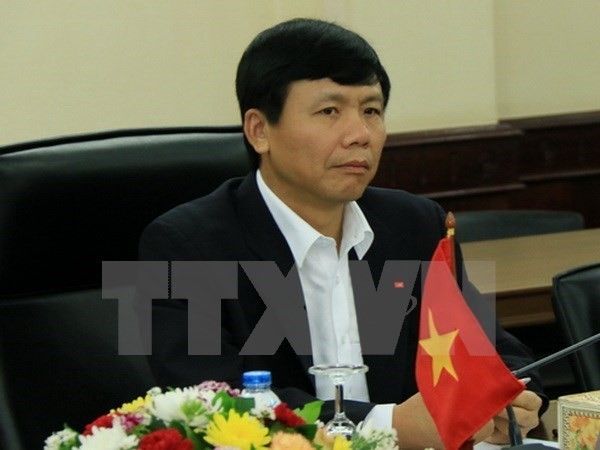Vietnam official underlines UNCLOS’s role in Goal 14 realisation at UN conference
The 1982 United Nations Convention on the Law of the Sea (UNCLOS) is a legal basis for the realisation of Sustainable Development Goal (SDG) 14, a Vietnamese official has stated.
Vietnamese Deputy Foreign Minister Dang Dinh Quy made the statement while delivering a speech at the recent UN Ocean Conference in New York.
He said Vietnam highly commends the Conference’s draft "Call for Action" and fully shares the view that the implementation of Goal 14, which is to conserve and sustainably use the oceans, seas and marine resources, requires strong partnership and cooperation among and between governments, enterprises, international and regional organisations as well as all other stakeholders.

Deputy Minister of Foreign Affairs Dang Dinh Quy (Photo: VNA)
The official noted the legal basis for this partnership and activities should be the universally recognised interpretation and application of international law, particularly the 1982 United Nations Convention on the Law of the Sea.
“Since there exist numerous areas of disputed water in the world, the compliance to and the implementation of duties under the United Nations Convention on the Law of the Sea would ensure maritime security and safety, and create a peaceful marine environment as cooperation and partnership would not be possible without peace and stability,” he added.
To successfully implement the "Call for Action", Quy highlighted the importance of raising the awareness in the society, especially local communities, of the need for the conservation and sustainable use of oceans, sea, and marine resources.
It is necessary to promote cooperative mechanisms at international, regional and sub-regional levels, especially in disputed waters, to maintain peace, stability, and development.
Meanwhile, developed countries should be encouraged to enhance capacity building, transfer of modern marine technology to developing and least-developed countries, thus helping strengthen their ocean-based sustainable economies, resilience to climate change and contribute to the conservation and sustainable use of oceans and seas, Quy said.
According to the Deputy Minister, Vietnam has integrated the SGDs into its national development plans and strategies. It has enacted the National Action Plan to implement SDGs of the 2030 Agenda, including Goal 14.
The United Nations Convention on the Law of the Sea (UNCLOS) was adopted in 1982 in Montego Bay, Jamaica, marking an enormous success of the Third UN Conference on the Law of the Sea.
This Convention now became the primary instrument governing the conduct of States in their uses of the ocean.
Since its entry into force on November 16, 1994, the UNCLOS has become an important legal basis for regulating maritime issues as well as an important legal instrument for settling and dealing with sea-related disputes. That is why the UNCLOS is considered as “A Constitution for the Oceans”.
As a country with 3,260km of coastline, Vietnam’s interest in the sea is significant. Aware of the significance of the sea, Vietnam has actively participated in the process of UNCLOS negotiations and made considerable efforts in implementing the Convention. It always upholds the purposes and objectives of the UNCLOS.
Since the adoption of the UNCLOS, Vietnam has actively applied relevant provisions of general international law as well as international law of the sea to develop its legislative and regulatory acts relating to the sea. In conformity with the progressive trend of international maritime law, Vietnam has promulgated “Declaration on the Territorial Sea, Contiguous Zone, Exclusive Economic Zone and Continental Shelf” in 1977 establishing the Exclusive Economic Zone of 200 nautical miles, extending the rights of Vietnam to the sea, not just confined to the right to fishing rights, but also other sovereign rights and jurisdiction. With this Declaration, Vietnam together with Kenya, Myanmar, Cuba, Yemen, Dominique, Guatemala, India, Pakistan, Mexico and Seychelles were the pioneering states in developing the concept of Exclusive Economic Zone, thus contributing to the development and consolidation of the practice of States, which later on became an important institution of the UNCLOS.
The Ratification Resolution of Vietnam reaffirmed the sovereignty of the Socialist Republic of Vietnam over its internal waters, territorial sea, sovereign rights and jurisdiction over the Contiguous Zone, Exclusive Economic Zone and Continental Shelf based on the provisions of the UNCLOS and principles of international law, and called on other countries to respect the above-mentioned rights of Vietnam.
The Resolution also reaffirmed the policy of Vietnam to settle disputes over territorial sovereignty and other disagreements related to the East Sea (South China Sea) through peaceful negotiations in the spirit of equality, mutual understanding and respect, with due respect for international law, particularly the UNCLOS and respect for sovereign rights and jurisdiction of coastal states over its Exclusive Economic Zone and Continental Shelf in accordance with the principles of the UNCLOS.
VNA
Vietnam Coast Guard vessel visits Philippines
 Vietnam attends 14th annual East Sea conference in US
Vietnam attends 14th annual East Sea conference in US
 Delegation visits Truong Sa island district, platform
Delegation visits Truong Sa island district, platform
 Overseas Vietnamese visit Truong Sa, DKI platform
Overseas Vietnamese visit Truong Sa, DKI platform
 Vietnam, China coast guards finish joint patrol
Vietnam, China coast guards finish joint patrol
 All activities in East Sea must comply with int’l law: deputy spokesperson
All activities in East Sea must comply with int’l law: deputy spokesperson
 Vietnam resolutely refutes illegal claims in East Sea: Spokeswoman
Vietnam resolutely refutes illegal claims in East Sea: Spokeswoman
 Vietnam deeply concerned about recent tension in East Sea: Spokeswoman
Vietnam deeply concerned about recent tension in East Sea: Spokeswoman
 DK1 platform stands firm on the wave front
DK1 platform stands firm on the wave front
 Sick fisherman saved at sea off Hoang Sa islands
Sick fisherman saved at sea off Hoang Sa islands



